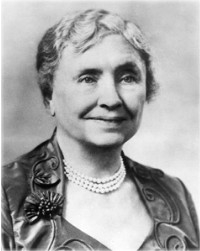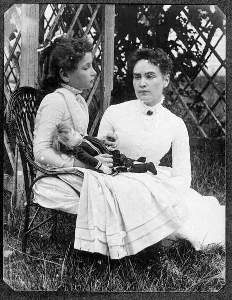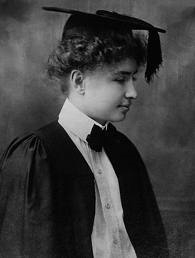 |
| (awhf.org ()) |
"Life is a daring adventure or nothing at all." Helen Keller's life epitomizes that life should be spent taking action to make a difference in the world, or else one has not lived life to its greatest potential. Keller, born on June 27, 1880, lived to be 87 when she died on June 1, 1968. "Best known as the deaf-blind girl who learned to communicate with the help of her teacher, Anne Sullivan, Keller was also a strict socialist, a public speaker, an author, a vaudeville performer, a world traveler, and, most important, an advocate for those living with blindness and serious visual impairment" (Hess 6). Keller's most important accomplishment is considered to be the work she performed for the blind under the auspices of the American Foundation for the Blind, an organization she served for four decades (Hess 2). Throughout her life, she accumulated an impressive amount of accomplishments that inspired and motivated people to do more in life. Keller met all of her struggles with optimism and courage and these personality traits are what motivated so many people. She was a hero who managed to inspire great feats in others despite the personal challenges of being blind and deaf. Rather than cower to a life of silence and darkness, her acts of kindness and humility towards people facing similar struggles as her own proved to be an example of a life that could be lived despite being blind and deaf rather than the life expected in that era.
Helen Keller faced all of her struggles with great optimism. Many people acknowledged the strength she had throughout her life: "But as John Macy, the editor of Keller's autobiography, observed, 'Her life (had) been a series of attempts to do what other people do, and do it as well'" (Hess 22). Keller was not willing to accept being told that she could not do something. She had a strong sense of belief in herself and proved all of the expected limitations set on her, to be incorrect. Despite receiving offers to attend schools that would provide her extra help during lessons, she refused these offers. Never did her hopes to be treated equally diminish, allowing her to persevere through the struggles she often faced. Helen Keller's own self-awareness is noted in her poignant statement: "If happiness is to be so measured, I who cannot hear or see have every reason to sit in a corner with folded hands and weep. If I am happy in spite of my deprivations, if my happiness is so deep that it is a faith, so thoughtful that it becomes a philosophy of life, - if, in short, I am an optimist, my testimony to the creed of optimism is worth hearing." (Helen Keller "Optimism Within") Helen Keller understood that it would be simple for her to just give up and live in solitude, however that is not what she believed life was truly about. The physical objects that many people consider to be a measure of happiness was not her definition of happiness. Her happiness was measured through her eyes and not the eyes of the word around her. Just because should could not see, did not mean she did not have vision. Keller's ability to persevere through her struggles was directly related to the courage she exemplifies when defying the odds of her disabilities and refusing to accept the expected societal norms for a person without the ability to see or hear.
 |
| (helenkellerbirthplace.org ()) |
Helen Keller displayed tremendous courage when facing the daily challenges of her disabilities. Many people presumed that she could not achieve anything of great significance and frowned upon her persistent efforts to assimilate with society: "They believe that all that has been done is all that can be done. They ridicule every departure from practice. 'No deaf-blind person has ever taken a college course,' they say. 'Why do you attempt what no one else has ventured? Even if you succeed in passing the entrance examinations, you cannot go on after you get into college. You have no books. You cannot hear lectures. You cannot make notes. You are most foolhardy to attempt something in which you are sure to fail.'" (Helen Keller "An Apology for Going to College") Helen Keller had a multitude of people serving as obstructionists in her desire to attend college. Keller looked past all of the rejections and negativity and fought for what she desired no matter the embarrassment or failure to come. She remained determined to look past all of these unfounded expectations of presumed certain failure. In order to surpass failure, one must accept the possibility of failure as equal to the possibility of success. In the end, her undying devotion to her desire to succeed proved to be the reason for her being able to overcome immense obstacles and accomplish her lifelong dream of being college educated. Her keen awareness of her own abilities and personal sense of self-worth and confidence were the catalyst that allowed her to eventually prove her doubters wrong. At a young age she demonstrated strong personal fortitude to accept the fear of facing unknown obstacles: "She jumped fearlessly into new experiences even when she didn't know what she was getting into- after her first tumble in the ocean surf, she stumbled out of the waves, asked 'Who put salt in the water?' and quickly ran back in." (Hess 18) In her early years, her world was filled with darkness and silence. Later as she acquired more knowledge, she gained the familiarity of the world she dreamed of for so long. She became acutely aware that in order to learn new things, she had to be willing to attempt things she was not familiar or often comfortable with initially. She had to have trust in her teacher, Anne Sullivan, to lead her to things and places she would feel comfortable with and enjoy. For example, when she was at the ocean at a young age, she did not let the fear of danger overcome her and was unafraid to plunge into a situation she had very little knowledge about. Instead, she looked out at the potential of a learning experience and went for it. Keller's courage empowered people to not be afraid of things unknown to them. She taught people that you should not let fear prevent you from trying something new. Helen Keller's immense courage allowed her to attack things head on, facing her fears and not letting people defeat her unjustly because of her disabilities.
 |
| (gardenofpraise.com ()) |
Keller's great optimism and courage gave people with similar struggles a chance to live their lives the way they wished and dreamed. Keller inspired me to believe that I can achieve anything that I desire in life. She spent much of her life proving to people that she could achieve what many people believed to be unimaginable for someone with her disabilities. Keller is a positive example that you should never let anyone tell you that you cannot do something. Her lifelong struggle serves as proof that one should always fight to make ones dreams a reality. Helen Keller exemplifies the definition of a true hero. She not only inspired me but others as well with strength and determination to overcome the greatest of obstacles. Keller did two remarkable things in life: she learned to overcome her most powerful internal conflict of being blind and deaf and in doing so, she helped others do the same. Helen Keller's life long struggle and accomplishments prove that few desirable things in life are found along the path of least resistance.
Feeney, Donna D. "From Darkness And Silence: The Remarkable Journey Of Helen Keller." Biography 3.5 (1999): 102. Biography Reference Center. Web. 11 Dec. 2012.
"Helen Keller." Contemporary Heroes and Heroines. Vol. 1. Gale, 1990. Gale Biography . Web. 11 Dec. 2012.
Hess, Aimee. Helen Keller. San Francisco, CA: Pomegranate, 2006. Print.
"Leading the Vision Loss Community." About Us. American Foundation for the Blind, n.d. Web. 11 Dec. 2012.
"Helen Keller." Great Lives From History: The Twentieth Century (2008): 1. Biography Reference Center. Web. 11 Dec. 2012.
Page created on 1/11/2013 12:00:00 AM
Last edited 1/11/2013 12:00:00 AM
